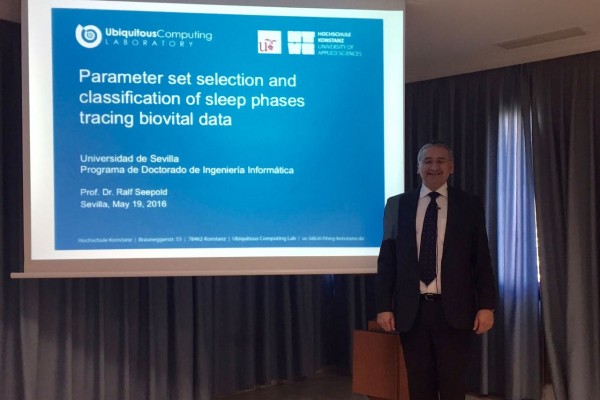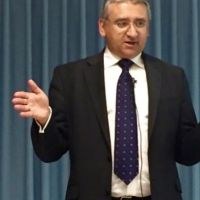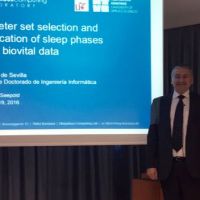Cooperation in doctoral program
Sevilla, May 19, 2016. Sleep is an important part of our life, since we are spending, on average, one third of it sleeping. Studies have shown that essential health functions like memory consolidation, organ repair and growth occur almost completely during sleep. As part of the doctoral program 'Ingeniería Informática' at the Universidad de Sevilla, Prof. Dr. Juan Antonio Ortega scheduled a contribution from the Ubiquitous Computing Lab at HTWG Konstanz. Prof. Dr. Ralf Seepold presented an introduction into the detection of sleep stages and recent results obtained by several researcher of his lab. Contributions from Agnes Klein and Oana-Ramona Velicu demonstrated successful developments in this domain. Parts of the results have been published in the last IEEE EMBS conference. This contribution to the doctoral program and ongoing tutoring of doctoral students from both universities is documenting the close relationship between the directors of the laboratories from Konstanz and Seville.

Short abstract of the session entitled 'Parameter set selection and classification of sleep phases tracing biovital data'
Sleep is an important part of our life, since we spend, on average, one third of it sleeping. Studies have shown that essential health functions like memory consolidation, organ repair and growth occur almost completely during sleep. To evaluate the quality of a person´s sleep it is necessary to identify the sleep stages and their durations. It is a known fact that changes in brain activity and physiological functions are quite profound during sleep. Nowadays there is a rich diversity of sleep monitoring systems available on the market. They promise to offer information about sleep quality of a user by recording a limited number of vital signals, mainly heart rate and body movement. Currently, the gold standard in terms of sleep analysis is overnight polysomnography (PSG), during which several techniques like EEG (eletroencephalogram), EOG (electrooculogram), EMG (electromyogram), ECG (electrocardiogram), SpO2 (blood oxygen saturation) and for example respiratory airflow and respiratory effort are recorded. These expensive and complex procedures, applied in sleep laboratories, are invasive and unfamiliar for the subjects and it is a reason why it might have an impact on the recorded data. One goal is to find a reduced complexity method to process a minimum number of bio vital signals, while providing accurate sleep classification results. The presentation will give an inside into the current status of research and application of techniques suited to make more accurate statements about sleep-wake phases or even the classification into the different stages.



